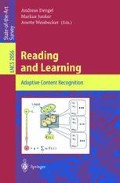Abstract
In the following chapter we describe how a postal address reader is made adaptive. A postal address reader is a huge application, so we concentrate on technologies used to adapt it to a few important tasks. In particular, we describe adaptation strategies for the detectors and classifiers of regions of interest (ROI), for the classifiers for single character recognition, for a hidden Markov recogniser for hand written words and for the address dictionary of the reader. The described techniques have been deployed in all postal address reading applications, including parcel, flat, letter and in-house mail sorting.
Access this chapter
Tax calculation will be finalised at checkout
Purchases are for personal use only
Preview
Unable to display preview. Download preview PDF.
References
Kaltenmeier, C., Caesar, T., Gloger, J., Mandler, E.: Sophisticated topology of hidden Markov models for cursive script recognition. In: Proc. of the 2nd Int. Conf. on document analysis and recognition, Tsukuba Science City, Japan, October 1993, pp. 139–142. IEEE Computer Society Press, Los Alamitos (1993)
Bahlmann, C., Burkhardt, H.: Measuring HMM similarity with the Bayes probability of error. In: Proc. of the 6th Int. Conf. on document analysis and recognition, Seattle, WA, September 2001, pp. 406–411. IEEE Computer Society Press, Los Alamitos (2001)
Schambach, M.-P.: Model length adaptation of an HMM based cursive word recognition system. In: Proc. of the 7th Int. Conf. on Document Analysis and Recognition, Edinburgh, Scotland (August 2003)
Rabiner, L.R.: A tutorial on hidden Markov models and selected applications in speech recognition. Proceedings of the IEEE 77(2), 257–285 (1989)
Schambach, M.-P.: Determination of the number of writing variants with an HMM based cursive word recognition system. In: Proc. of the 7th Int. Conf. on Document Analysis and Recognition, Edinburgh, Scotland (August 2003)
Cheeseman, P., Stutz, J.: Bayesian classification (AutoClass): Theory and results. In: Fayyad, U.M., Piatetsky-Shapiro, G., Smyth, P., Uthurusamy, R. (eds.) Advances in Knowledge Discovery and Data Mining, pp. 153–180. MIT Press, Cambridge (1996)
Schambach, M.-P.: Automatische Modellierung gebundener Handschrift in einem HMMbasierten Erkennungssystem. Proposed Dissertation, Universität Ulm (2003)
Sürmann, J.: Pattern Classification A Unified View of Statistical and Neural Approaches. Recursive Learning, ch. 6.14, pp. 165–182. Wiley-Interscience, Hoboken (1996)
Okuda, K., Tanaka, E., Kasai, T.: A Method for the Correction of Garbled Words, based on the Levenshtein Metric. IEEE Transactions on Computers c-25(2) (February 1976)
Author information
Authors and Affiliations
Editor information
Editors and Affiliations
Rights and permissions
Copyright information
© 2004 Springer-Verlag Berlin Heidelberg
About this chapter
Cite this chapter
Schäfer, H., Bayer, T., Kreuzer, K., Miletzki, U., Schambach, MP., Schulte-Austum, M. (2004). How Postal Address Readers Are Made Adaptive. In: Dengel, A., Junker, M., Weisbecker, A. (eds) Reading and Learning. Lecture Notes in Computer Science, vol 2956. Springer, Berlin, Heidelberg. https://doi.org/10.1007/978-3-540-24642-8_12
Download citation
DOI: https://doi.org/10.1007/978-3-540-24642-8_12
Publisher Name: Springer, Berlin, Heidelberg
Print ISBN: 978-3-540-21904-0
Online ISBN: 978-3-540-24642-8
eBook Packages: Springer Book Archive

